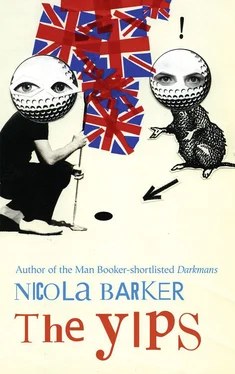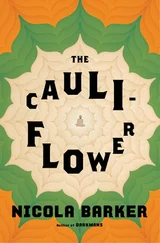Nicola Barker - The Yips
Здесь есть возможность читать онлайн «Nicola Barker - The Yips» — ознакомительный отрывок электронной книги совершенно бесплатно, а после прочтения отрывка купить полную версию. В некоторых случаях можно слушать аудио, скачать через торрент в формате fb2 и присутствует краткое содержание. Год выпуска: 2012, Издательство: Fourth Estate, Жанр: Современная проза, на английском языке. Описание произведения, (предисловие) а так же отзывы посетителей доступны на портале библиотеки ЛибКат.
- Название:The Yips
- Автор:
- Издательство:Fourth Estate
- Жанр:
- Год:2012
- ISBN:нет данных
- Рейтинг книги:4 / 5. Голосов: 1
-
Избранное:Добавить в избранное
- Отзывы:
-
Ваша оценка:
- 80
- 1
- 2
- 3
- 4
- 5
The Yips: краткое содержание, описание и аннотация
Предлагаем к чтению аннотацию, описание, краткое содержание или предисловие (зависит от того, что написал сам автор книги «The Yips»). Если вы не нашли необходимую информацию о книге — напишите в комментариях, мы постараемся отыскать её.
The Yips — читать онлайн ознакомительный отрывок
Ниже представлен текст книги, разбитый по страницам. Система сохранения места последней прочитанной страницы, позволяет с удобством читать онлайн бесплатно книгу «The Yips», без необходимости каждый раз заново искать на чём Вы остановились. Поставьте закладку, и сможете в любой момент перейти на страницу, на которой закончили чтение.
Интервал:
Закладка:
He unhooks his hands from behind her knees, but — and this is the thing that will haunt him later; an unforgivable detail; a terrible omission — he neglects to disconnect his warm, flat palms from the gleaming shellac of her skin as her feet slither to the ground. His hands — almost as if now creatures of their own agency — run up the side of her legs to her hips as she lightly descends, concluding in the delicate silk of her shorts as she lands.
She remains where she is for a moment, her arms slung loosely about his neck, her forehead pressed softly into the middle of his back.
He worries that she might cut her bare feet on a remnant of broken glass. He remembers, in passing, that Mallory wanted him to check her geography homework, that he needs to ring the tax office, that there’s a problem with the liquid soap delivery at work, and the overwhelming nature of these worries — their dull particularity, their utter inexorability — spurs him into inhabiting the moment more absolutely, as if a scale has been tipped, or a heavy weight has been dropped on to the opposite side of a seesaw, a weight so thudding and absolute that he has been thrown into the air, jettisoned, like a cannonball, and while he knows — he knows — that everything must crash and splat and splinter once gravity finally takes its toll, just to be there, to feel the glistening immediacy of that moment, the freedom of it, the heat of it, the cloying warmth of its stickiness …
Valentine’s hands, meanwhile — those mysterious hands, those artistic hands — are moving over his shoulders, then swooping down to his ribs. She feels each rib, individually, plays them like the slight, multicoloured, metal keys of a child’s xylophone. His body sings to her touch — not a grand composition of different movements and complex parts (something you might require a full orchestra to produce), but a tiny, reedy, little tune, an inconsequential ditty written for a four-stringed banjo, a battered kick-drum and dented harmonica.
‘There isn’t a gap,’ he mumbles, again, as the moon re-emerges from behind its cloud spitting out joyous cheekfuls of lemon curd. They stand still, barely breathing, drenched — almost submerged — in the sweet intoxication of its dripping yolk.
‘Someone must’ve sealed it up,’ she murmurs.
He lifts his hands from her hips and she pushes herself harder against the back of him.
‘If you let go of me, I’ll drown,’ she whispers.
‘If I don’t …’ he replies –
But the tongue in his mouth is no longer his instrument. It is heavy with longing; unwieldy; a damp, feather eiderdown of desire. It is too late, he tells himself (never more cynical and adept than in this instant): the trigger has been squeezed, the deathly mechanism has been enabled, the fatal course of a bullet has now been set. No amount of bleating or praying or willing or cajoling can halt it or stall it or call it back.
Chapter 6
Sheila has an extremely furtive air about her. She is dressed in her standard, drab black and dog collar, but her hair is down and unkempt, falling over her face — one large segment hastily pinned back with an oversized paper-clip. She is in Stanislav’s room, sitting at his small desk, hunched over his computer, completing an email.
Pressed under her elbow are three editions of a magazine (hailing from some time in the early nineties), poorly printed on low-quality paper, which she has recently dug out of a box in the garage. The magazine is called OnTheRag . The cover of the top copy features a photograph of a bulldog with a tampon dangling from between its lips wearing a Union Jack bikini stuffed with screwed-up pages from the Sun .
Another edition is opened to the contents page where there are four contributors’ mug shots, one of which is of Sheila herself as a student journalist, spitting out her tongue, fists clenched, combatively, at her chin (on the knuckles the words ‘riot’ and ‘grrl’ scribbled in Biro, a lit roll-up clutched between the ‘g’ and the first ‘r’). She wears heavy, black eye make-up and her brutally hennaed hair is carelessly sculpted into a jaunty mohican.
Elsewhere in the house, two phones are ringing.
After an extended period of frenzied typing Sheila re-reads her email, grimaces, re-reads it again, adds a couple of tiny alterations, then presses ‘send’. One of the phones stops ringing. She glances down at her contributor’s photo with a wan smile. The second phone stops ringing. She rises to her feet and goes to stand in the doorway.
‘Bugger off, school governors!’ she mutters, peeking around the doorframe like a naughty child, then checking her watch, guiltily, her shoulders slumping forward slightly.
The second phone starts up again. Its insistent beep appears to be emanating from the general direction of her bedroom. Sheila plods off to answer it, removing an elastic band from around her wrist (which the post had come tied up in that very morning) and arranging her hair into a scruffy ponytail.
Arriving at her dressing table (where the phone currently sits), she swipes an impatient hand over her new hairstyle, encounters the paper-clip, scowls, pulls it out and inspects it, bemused.
Her phone rings on as she drops the clip into a tiny, cracked ceramic bowl (containing a vial of anti-nail-biting solution, a pair of cheap stud earrings and an acorn) which perches to the rear of the table’s protective, glass top. She finally picks up the phone. It falls silent the instant she places it to her ear. She opens her mouth to speak, then closes it again, shrugs, throws down the phone and leans forward to look at herself in the mirror.
She seems neither depressed nor delighted by the weatherworn sight that greets her there, just rubs a tiny crust of sleep from the corner of her left eye and roughly shoves her fringe behind her ear. The natural curl in her hair refuses to be gainsaid, however, tossing the doughty lock (like a persistent drunk being repeatedly ejected from a nightclub) straight back out on to her cheek again.
Sheila tuts, yanks open a drawer, removes a pair of nail scissors, unties her hair, pulls the fringe over her eyes, grips it between her fingers and hacks off several inches. She stares at herself and then hacks off a further inch for good measure (carefully wrapping the cut hair inside a tissue which she pushes into her pocket to dispose of later). The remaining hair she ties back into a ponytail, then nods at her reflection, satisfied.
She returns to the desk in Stan’s room, perches on the edge of his chair and shuts down the Outlook Express, but hesitates before closing down the entire computer. Instead she opts to access her My Pictures file and goes to her five most recent downloads, one after the other.
‘Astonishing!’ she mutters, her face pressed up close to the screen, her fingers delicately guiding the mouse. ‘It’s all there — fully realized … just needs the odd, tiny … a little bit of … the minutest tweak …’
As she speaks she raises her free hand to her cheek to tuck her unruly fringe behind her ear, but there is no fringe. The fringe is reduced. Yet still, the hand tucks, then tucks again, then tucks for a third time before resting, finally, on her throat. Her throat seems unusually warm to the touch, the tips of her fingers incalculably more sensitive.
‘Just needs someone to step in and shift things around,’ she mumbles, gazing at the screen. ‘Set things into context. A fixer. A visionary. A mediator …’
The downstairs phone starts ringing again.
‘Christ was a mediator,’ she muses, hoarsely, finally looking up.
Somewhat haggard and bleary-eyed after a long and spectacularly unproductive night at the hospital, Toby Whittaker is trying (and failing) to referee an argument between two quarrelsome beauticians in the cramped passageway outside Ransom’s hotel room.
Читать дальшеИнтервал:
Закладка:
Похожие книги на «The Yips»
Представляем Вашему вниманию похожие книги на «The Yips» списком для выбора. Мы отобрали схожую по названию и смыслу литературу в надежде предоставить читателям больше вариантов отыскать новые, интересные, ещё непрочитанные произведения.
Обсуждение, отзывы о книге «The Yips» и просто собственные мнения читателей. Оставьте ваши комментарии, напишите, что Вы думаете о произведении, его смысле или главных героях. Укажите что конкретно понравилось, а что нет, и почему Вы так считаете.












